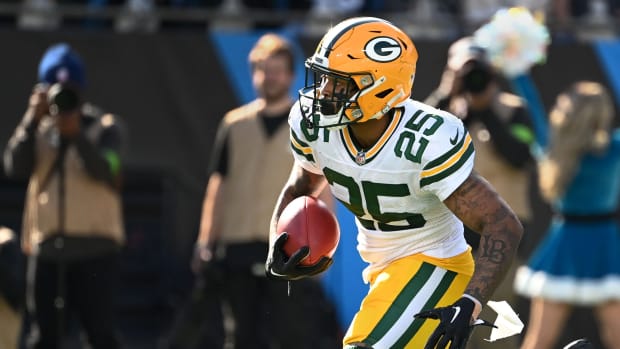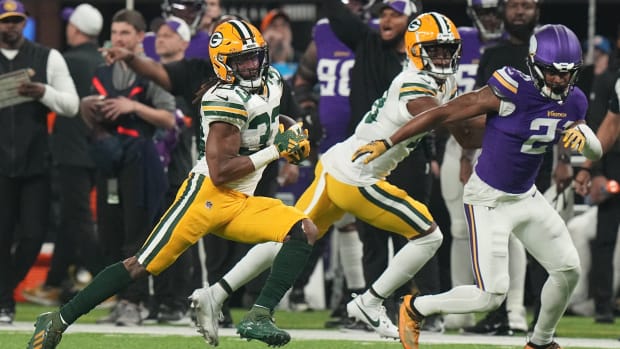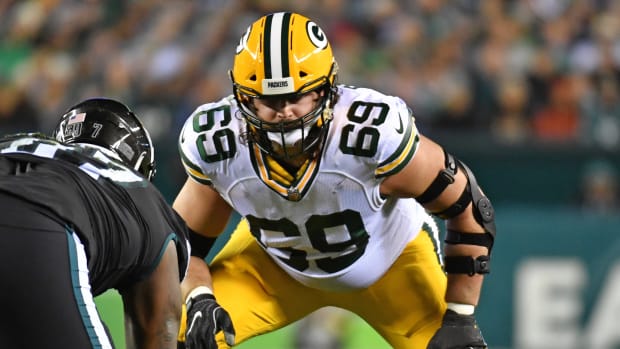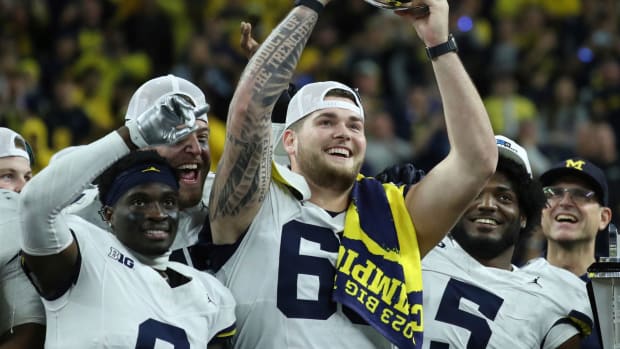Packers Earn No. 1 Seed; Here’s Why It Matters
GREEN BAY, Wis. – The Green Bay Packers earned the No. 1 seed in the NFC playoffs and homefield advantage with their victory over the Minnesota Vikings on Sunday night. It’s a major reward, last year’s bitter defeat in the NFC Championship Game notwithstanding.
In the seven playoffs from 2013 through 2019, all 14 teams that reached the Super Bowl were a No. 1 or No. 2 seed, meaning a first-round bye. That changed during last year’s expanded postseason. With only the No. 1 seed getting a bye, the NFC South runner-up Tampa Bay Buccaneers won three road games as the No. 5 seed to reach the Super Bowl, which they won on their home turf.
“I don’t think anybody in that locker room is going to take a deep breathe like ‘Hey, we’ve arrived,’” coach Matt LaFleur said after the game. “Every game basically from here on out is do or die, and you have to prepare throughout the week to be your best, and we know that going into each and every game.”
Here are three reasons why what the Packers accomplished on Sunday night is a big deal.
One: Bye Week
Really, perhaps the most important prize of them all is not having to play in the first round. In the history of professional football, no team has ever lost during its bye. The NFC playoff field is strong. As it stands, the three teams that will be hitting the road for the Super Wild Card round are dangerous.
The No. 7 seed is Philadelphia, which has the best running game in the NFL, has won four in a row overall and finished 6-3 on the road. The No. 6 team is San Francisco, which has stars on its roster and a history of playoff success vs. Green Bay. The No. 5 seed is Arizona, which has such a dangerous weapon with quarterback Kyler Murray and showed its power by winning at Dallas on Sunday.
To avoid a first-round game against one of those teams is a big deal.
Two: Some R&R
There’s the obvious advantage of getting the week of rest that the other six playoff teams in the NFC won’t enjoy. The Packers have been hit hard by injuries to key players. Beyond those big-name players – who may not even be a factor in the postseason – the Packers, like most teams this time of year, are dealing with a lot of bumps and bruises.
Running back Aaron Jones, for instance, has been in and out of the lineup during the second half of the season. He was shaken up on the fourth play against the Vikings, when linebacker Eric Kendricks diagnosed Jones’ pass route and was waiting. He might benefit from the bye more than anyone.
“It means, I don’t want to say a sense of relaxation, because that’s definitely not what it is at all, but it’s comforting to know that we have that to lean on,” receiver Davante Adams said of clinching a week early. “We’re pretty banged up, so anytime we can get some of our guys some extra rest, I think that’s what we’re definitely looking forward to. It take(s) a little bit of the pressure off but it definitely doesn’t mean we’re letting the foot off the gas going into next week.”
Three: No Place Like Home
Homefield advantage is sort of an antiquated thing. With one week to go in the regular season, home teams are 132-123-1. That’s a .518 winning percentage. When the Packers stormed through the NFC playoffs to win the Super Bowl in 1996, home teams had a .621 winning percentage. This year, four only of the league’s 32 teams have won at least six home games. In 1996, 12 of the 30 teams won at least six.
Green Bay was the only team to sweep through its home slate.
“I can’t speak to why the records are what they are, other than the fact that I think that when you come into our stadium, I think we have a pretty good football team and that definitely plays to our advantage in terms of our ability to use our snap count at home,” LaFleur said. “It definitely helps our defense when offenses are using silent counts. It doesn’t guarantee anything, but it definitely plays in favor of the home team.”
It didn’t mean anything against the Buccaneers, obviously, but with COVID raging and with no solutions to stop the spread, only 7,772 socially distanced fans watched the championship game. Almost exactly 10 times that many fans – 77,832, to be exact – filled the stadium on Sunday night.
“Compared to last year, having a crowd definitely makes a difference,” Rodgers said. “Last year in the playoffs, we obviously had pared-down crowds because of protocols, so it's nice to have a full crowd.”
Four: Green Bay Weather
In last year’s championship game, it was sunny 29 degrees with a wind chill of 20 – not exactly enough to turn the Buccaneers into ice statues. On Sunday night, it was 11 at kickoff with a wind chill of minus-1. By game’s end, it was 6.
“Last year, we didn’t get that good Green Bay weather. Tonight was one of those nights,” Rodgers said. “We haven’t had a game like this in a while, temperature wise. It’s just different. It is different. The whole feel of it. I feel like teams can break a little bit easier when it is this cold because there’s an excuse: the weather. We’re out there. We’re cold, as well. But when you’re rolling on offense, you kind of get that extra little jolt because you know the defense is on their heels a little bit and also they’re probably a little bit more cold than you are.”
The long-range forecast at Weather.com calls for a high of 25 and low of 14 for Saturday, Jan. 15, and a high of 22 and a low of 11 for Sunday, Jan. 16. While the Packers are watching the six Super Wild Card Weekend games from the comfort of their warm-and-toasty couches, they’ll no doubt be pulling for Old Man Winter.
“It’s nice to have a Green Bay weather game finally with the temperature at 10 to start,” Rodgers said. “It’s a different ballgame when it's cold at home, and we've handled the cold pretty well over the years. So, that's what we're hoping for in the playoffs.”




